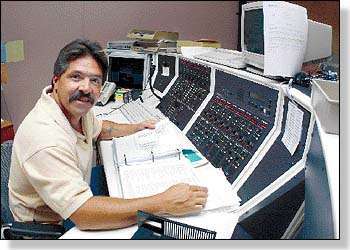Dispatchers answer emergency calls 24 hours a day Last Tuesday, September 11, was National 9-1-1 Day. The observance, co-sponsored by the National Heart, Lung and Blood Institute and the American Heart Association, paid tribute to those people who pick up
Dispatchers answer emergency calls 24 hours a day
Last Tuesday, September 11, was National 9-1-1 Day.
The observance, co-sponsored by the National Heart, Lung and Blood Institute and the American Heart Association, paid tribute to those people who pick up the phone when you call 9-1-1.
And according to Kaua’i County’s acting police chief, Wilfred Ihu, any positive attention such a day brings to Kaua’i’s 16 full-time dispatchers is a good call.
Every emergency request, be it rescue, fire or police, is routed through the dispatch center in Lihu’e. Ihu said the civilian dispatchers, who work in three eight-hour shifts every day, are subjected to emotional wear and tear.
“You know I can’t say enough about these guys. Those dispatchers go through so much stress. They receive all the calls, so they go through what the (police) officers go through,” Ihu said.
Ihu said the dispatchers in an average day take calls covering cats up a tree to unattended deaths, and everything in between.
Dispatch supervisor Miriam Klattenhoff, who has worked in the department for 21 years, said 148 9-1-1 calls came in on Aug. 31.
Although the dispatchers are civilian employees of the Police Department, Ihu said they receive some of the same training as duty officers, including briefings on sexual harassment and violence in the workplace.
On-the-job training encompasses listening and observing veteran dispatchers for at least a week, then going on the phones, with supervision, and then eventually handling calls themselves.
Klattenhoff, who has 16 dispatchers (the department is budgeted for 17), said dispatchers “must like to help people” and have at least a high school diploma.
“A lot of people think this is a clerical job, but it’s not. It is much more. They have to be able to prioritize, and they have empathy and compassion,” she said.
Ihu said dispatchers are given thorough tours of the island before they get behind the phones, so they know where the calls are coming from and where they are sending police, fire and other emergency rescue personnel.
Ihu said Kaua’i has an enhanced system which allows dispatchers to know where calls are coming from. In certain situations, a caller may hang up, either panicking or forced to by some sort of physical threat. But the 9-1-1 system automatically records the address of the caller and help can still be sent to the scene.
But dispatch only has five trunk lines, and sometimes when there is an accident and the cell phone callers all dial 9-1-1, some may be greeted with a ringing phone.
Nevertheless, “we handle all emergency complaints,” Klattenhoff said.
The dispatchers “do an amazing job,” saidi Bob Kaden, batallion chief for the county Fire Department. “They are really an asset. They are the nerve center of the island. They really step up to the plate each and every day.”
Staff writer Dennis Wilken can be reached at 245-3681 (ext. 252) and mailto:dwilken@pulitzer.net


